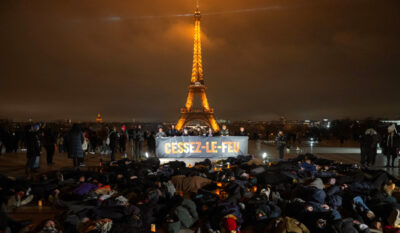March Quarterly Donor Update
Ukraine
On February 20th the world watched as Russia sent troops into Ukraine. With millions of civilian lives at risk, in what analysts are referring to as ‘Europe’s first major war since World War Two’, Crisis Action set plans in motion to convene partners and political analysts to assess how best to respond.
Rapid work to convene civil society leaders to stand with Ukraine in response to Russian invasion
Crisis Action convened representatives of over 80 different civil society organisations from across the globe to participate in a webinar to discuss the humanitarian impact, analyse what is needed in the international response to protect civilians, and to assess if and how Crisis Action can support existing efforts and add value in coordinating a joint civil society response. It was attended by partners from Russia and Ukraine, key international human rights NGOs – such as Amnesty, Human Rights Watch, International Federation for Human Rights; leading humanitarian organisations such as Norwegian Refugee Council, Save the Children and European and African organisations such as Atrocities Watch Africa, No Peace Without Justice and think tank friends such as International Crisis Group.
During the call, kicked off by the former Finnish Prime Minister, Alex Stubb, partners discussed international action to raise the cost of the war for President Putin. This included through:
- (i) diplomatic means, economic sanctions and international public initiatives
- (ii) humanitarian support and upholding International Humanitarian Law to better protect civilians
- (iii) accountability measures, with a view to deterring and holding Russia to account for human rights violations that do occur, and,
- (iv) amplifying the voices of Ukrainians as well as Russian dissenters.
Crisis Action are also helping disseminate the Kyiv Declaration, which is an urgent appeal by 40 Ukrainian civil society leaders. The team have been supporting partners to speak to media in India, South Africa and Kenya about protection issues and the human rights situation in advance of key United Nations meetings, as well as working through networks to sign up key figures to support the Kyiv Declaration.
Further to this, Crisis Action has convened high level meetings in Paris, and worked at the New York level with partners around the United Nations Security Council and United Nations General Assembly to influence states, supplying political intelligence and reach to Global South networks. As the conflict rapidly develops, Crisis Action will continue to explore how best to support its global partner network in the coming days and weeks. This includes enhancing coordination among diverse campaigning efforts and ensuring impactful divisions of labour, supporting Russian partners to elevate critical Russian public opinion and secure independent Russian media coverage on Russia’s military invasion.


